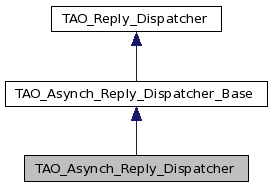Reply dispatcher for Asynchoronous Method Invocation (AMI)s. More...
#include <Asynch_Reply_Dispatcher.h>


Public Member Functions | |
| TAO_Asynch_Reply_Dispatcher (const TAO_Reply_Handler_Stub &reply_handler_stub, Messaging::ReplyHandler_ptr reply_handler_ptr, TAO_ORB_Core *orb_core, ACE_Allocator *allocator) | |
| Constructor. | |
| virtual | ~TAO_Asynch_Reply_Dispatcher (void) |
| Destructor. | |
| virtual void | reply_timed_out (void) |
| Inform that the reply timed out. | |
| long | schedule_timer (CORBA::ULong request_id, const ACE_Time_Value &max_wait_time) |
| Install the timeout handler. | |
The Reply Dispatcher methods | |
| virtual int | dispatch_reply (TAO_Pluggable_Reply_Params ¶ms) |
| virtual void | connection_closed (void) |
Private Attributes | |
| TAO_Reply_Handler_Stub const | reply_handler_stub_ |
| Stub for the call back method in the Reply Handler. | |
| Messaging::ReplyHandler_var | reply_handler_ |
| Reply Handler passed in the Asynchronous Invocation. | |
| TAO_Asynch_Timeout_Handler * | timeout_handler_ |
| Timeout Handler in case of AMI timeouts. | |
Reply dispatcher for Asynchoronous Method Invocation (AMI)s.
Definition at line 35 of file Asynch_Reply_Dispatcher.h.
| TAO_Asynch_Reply_Dispatcher::TAO_Asynch_Reply_Dispatcher | ( | const TAO_Reply_Handler_Stub & | reply_handler_stub, | |
| Messaging::ReplyHandler_ptr | reply_handler_ptr, | |||
| TAO_ORB_Core * | orb_core, | |||
| ACE_Allocator * | allocator | |||
| ) |
Constructor.
Definition at line 16 of file Asynch_Reply_Dispatcher.cpp.
:TAO_Asynch_Reply_Dispatcher_Base (orb_core, allocator) , reply_handler_stub_ (reply_handler_stub) , reply_handler_ (Messaging::ReplyHandler::_duplicate (reply_handler)) , timeout_handler_ (0) { }
| TAO_Asynch_Reply_Dispatcher::~TAO_Asynch_Reply_Dispatcher | ( | void | ) | [virtual] |
| void TAO_Asynch_Reply_Dispatcher::connection_closed | ( | void | ) | [virtual] |
The used for the pending reply has been closed. No reply is expected.
Implements TAO_Reply_Dispatcher.
Definition at line 147 of file Asynch_Reply_Dispatcher.cpp.
{
try
{
if (this->timeout_handler_)
{
// If we had registered timeout handlers just cancel them and
// loose ownership of the handlers
this->timeout_handler_->cancel ();
this->timeout_handler_->remove_reference ();
this->timeout_handler_ = 0;
}
if (!this->try_dispatch_reply ())
return;
if (!CORBA::is_nil (this->reply_handler_.in ()))
{
// Generate a fake exception....
CORBA::COMM_FAILURE comm_failure (0, CORBA::COMPLETED_MAYBE);
TAO_OutputCDR out_cdr;
comm_failure._tao_encode (out_cdr);
// Turn into an output CDR
TAO_InputCDR cdr (out_cdr);
this->reply_handler_stub_ (cdr,
this->reply_handler_.in (),
TAO_AMI_REPLY_SYSTEM_EXCEPTION);
}
}
catch (const ::CORBA::Exception& ex)
{
if (TAO_debug_level >= 4)
{
ex._tao_print_exception (
"Asynch_Reply_Dispatcher::connection_closed");
}
}
this->intrusive_remove_ref (this);
}
| int TAO_Asynch_Reply_Dispatcher::dispatch_reply | ( | TAO_Pluggable_Reply_Params & | params | ) | [virtual] |
Dispatch the reply. Return 1 on sucess, -1 on error.
Implements TAO_Reply_Dispatcher.
Definition at line 36 of file Asynch_Reply_Dispatcher.cpp.
{
if (this->timeout_handler_)
{
// If we had registered timeout handlers just cancel them and
// loose ownership of the handlers
this->timeout_handler_->cancel ();
this->timeout_handler_->remove_reference ();
this->timeout_handler_ = 0;
// AMI Timeout Handling End
}
if (!params.input_cdr_)
return -1;
if (!this->try_dispatch_reply ())
return 0;
this->reply_status_ = params.reply_status ();
this->locate_reply_status_ = params.locate_reply_status ();
// Transfer the <params.input_cdr_>'s content to this->reply_cdr_
ACE_Data_Block *db = this->reply_cdr_.clone_from (*params.input_cdr_);
if (db == 0)
{
if (TAO_debug_level > 2)
{
ACE_ERROR ((
LM_ERROR,
ACE_TEXT ("TAO_Messaging (%P|%t) - Asynch_Reply_Dispatcher::dispatch_reply ")
ACE_TEXT ("clone_from failed\n")));
}
return -1;
}
// See whether we need to delete the data block by checking the
// flags. We cannot be happy that we initally allocated the
// datablocks of the stack. If this method is called twice, as is in
// some cases where the same invocation object is used to make two
// invocations like forwarding, the release becomes essential.
if (ACE_BIT_DISABLED (db->flags (), ACE_Message_Block::DONT_DELETE))
{
db->release ();
}
if (!CORBA::is_nil (this->reply_handler_.in ()))
{
// Steal the buffer, that way we don't do any unnecesary copies of
// this data.
CORBA::ULong const max = params.svc_ctx_.maximum ();
CORBA::ULong const len = params.svc_ctx_.length ();
IOP::ServiceContext *context_list = params.svc_ctx_.get_buffer (1);
this->reply_service_info_.replace (max, len, context_list, 1);
if (TAO_debug_level >= 4)
{
ACE_DEBUG ((LM_DEBUG,
ACE_TEXT ("TAO_Messaging (%P|%t) - Asynch_Reply_Dispatcher")
ACE_TEXT ("::dispatch_reply status = %d\n"),
this->reply_status_));
}
CORBA::ULong reply_error = TAO_AMI_REPLY_NOT_OK;
switch (this->reply_status_)
{
case GIOP::NO_EXCEPTION:
reply_error = TAO_AMI_REPLY_OK;
break;
case GIOP::USER_EXCEPTION:
reply_error = TAO_AMI_REPLY_USER_EXCEPTION;
break;
case GIOP::SYSTEM_EXCEPTION:
reply_error = TAO_AMI_REPLY_SYSTEM_EXCEPTION;
break;
case GIOP::LOCATION_FORWARD:
reply_error = TAO_AMI_REPLY_LOCATION_FORWARD;
break;
case GIOP::LOCATION_FORWARD_PERM:
reply_error = TAO_AMI_REPLY_LOCATION_FORWARD_PERM;
break;
default:
// @@ Michael: Not even the spec mentions this case.
// We have to think about this case.
// Handle the forwarding and return so the stub restarts the
// request!
reply_error = TAO_AMI_REPLY_NOT_OK;
break;
}
try
{
// Call the Reply Handler's stub.
this->reply_handler_stub_ (this->reply_cdr_,
this->reply_handler_.in (),
reply_error);
}
catch (const ::CORBA::Exception& ex)
{
if (TAO_debug_level >= 4)
ex._tao_print_exception ("Exception during reply handler");
}
}
this->intrusive_remove_ref (this);
return 1;
}
| void TAO_Asynch_Reply_Dispatcher::reply_timed_out | ( | void | ) | [virtual] |
Inform that the reply timed out.
Implements TAO_Reply_Dispatcher.
Definition at line 196 of file Asynch_Reply_Dispatcher.cpp.
{
try
{
// @@ This check probably is unnecessary..
if (this->timeout_handler_)
{
// If we had registered timeout handlers just cancel them and
// loose ownership of the handlers
this->timeout_handler_->remove_reference ();
this->timeout_handler_ = 0;
}
// This is okay here... Everything relies on our refcount being
// held by the timeout handler, whose refcount in turn is held
// by the reactor.
if (!this->try_dispatch_reply ())
return;
if (!CORBA::is_nil (this->reply_handler_.in ()))
{
// Generate a fake exception....
CORBA::TIMEOUT timeout_failure (
CORBA::SystemException::_tao_minor_code (
TAO_TIMEOUT_RECV_MINOR_CODE,
errno),
CORBA::COMPLETED_MAYBE);
TAO_OutputCDR out_cdr;
timeout_failure._tao_encode (out_cdr);
// Turn into an output CDR
TAO_InputCDR cdr (out_cdr);
this->reply_handler_stub_ (cdr,
this->reply_handler_.in (),
TAO_AMI_REPLY_SYSTEM_EXCEPTION);
}
}
catch (const ::CORBA::Exception& ex)
{
if (TAO_debug_level >= 4)
{
ex._tao_print_exception ("Asynch_Reply_Dispatcher::reply_timed_out");
}
}
this->intrusive_remove_ref (this);
}
| long TAO_Asynch_Reply_Dispatcher::schedule_timer | ( | CORBA::ULong | request_id, | |
| const ACE_Time_Value & | max_wait_time | |||
| ) | [virtual] |
Install the timeout handler.
Implements TAO_Asynch_Reply_Dispatcher_Base.
Definition at line 248 of file Asynch_Reply_Dispatcher.cpp.
{
if (this->timeout_handler_ == 0)
{
// @@ Need to use the pool for this..
ACE_NEW_THROW_EX (this->timeout_handler_,
TAO_Asynch_Timeout_Handler (
this->transport_->orb_core ()->reactor ()),
CORBA::NO_MEMORY ());
}
return this->timeout_handler_->schedule_timer (
this->transport_->tms (),
request_id,
max_wait_time);
}
Messaging::ReplyHandler_var TAO_Asynch_Reply_Dispatcher::reply_handler_ [private] |
Reply Handler passed in the Asynchronous Invocation.
Definition at line 68 of file Asynch_Reply_Dispatcher.h.
Stub for the call back method in the Reply Handler.
Definition at line 65 of file Asynch_Reply_Dispatcher.h.
Timeout Handler in case of AMI timeouts.
Definition at line 71 of file Asynch_Reply_Dispatcher.h.
 1.7.0
1.7.0